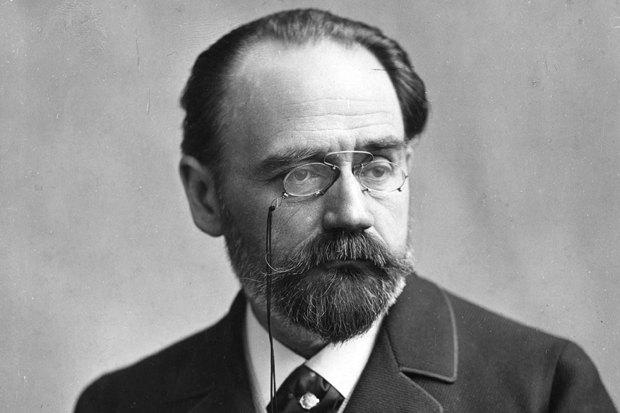Michael Rosen, a poet, journalist and prolific author of novels for children, has written an account of Emile Zola’s year’s exile in England between July 1898 and June 1899, as a result of his involvement in the Dreyfus Affair in France. It is not a dispassionate work of history but a homage to Zola, ‘a hero in my eyes’, for his fight against anti-Semitism. Zola not only made ‘a brave, unpopular, self-sacrificing decision to support a wrongly convicted man’, but also persuaded the socialist leader Jean Jaurès to join the fight against anti-Semitism: at the time of Dreyfus’s conviction in 1894, both Jaurès and Georges Clemenceau had called for him to be shot.
Emile Zola had been first attracted to the Dreyfus Affair as material for a book. ‘The novelist was above all seduced and exalted by such a drama,’ he wrote, ‘and pity, faith, the passion for truth and justice came later.’ The drama was intense — a Jewish army officer, Alfred Dreyfus, convicted of spying for the Germans, and sent to rot on Devil’s Island off the coast of French Guiana; the discovery that another officer, a Major Esterhazy, was the more likely culprit; the decision by the army’s high command to cover up for Esterhazy — all played out for the nation in a vibrant gutter press.
Fantasies flourished on both sides. The Dreyfusards ascribed the conspiracy against Dreyfus to the Jesuits: the anti-Dreyfusards claimed that a ‘Jewish syndicate’ was plotting to free the traitor to discredit the army. Neither was true. The rise of anti-Semitism shocked Zola, a bestselling novelist but also a prolific journalist: he denounced it in an article for Le Figaro, then waded into the Affair itself with an open letter to the President of France, Félix Faure. With remarkable accuracy, he named the senior officers behind the conspiracy against Dreyfus, deliberately courting a prosecution for libel that would bring the Affair before a civilian court.
Zola’s letter was published in the radical newspaper L’Aurore, part-owned by Georges Clemenceau: it was Clemenceau who chose the title for his polemic — J’Accuse. It caused an uproar throughout France. Already loathed by conservative French Catholics for his pornographic novels, his adulterous liaison with his wife’s maid, and for debunking the claim to miraculous cures in his book Lourdes, Zola’s intervention confirmed their suspicion that the Dreyfusards were amoral and unpatriotic, out to weaken France at a time of intense rivalry with both Germany and Britain. There were anti-Semitic riots throughout France. Zola was burned in effigy. J’Accuse certainly publicised the plight of Dreyfus but it also further polarised public opinion. The senator from Alsace, August Scheurer-Kestner, who had long been working behind the scenes for the rehabilitation of Dreyfus, was appalled by J’Accuse. ‘What a mistake! The era of stupidities began!’
Reluctantly the government sued Zola for libel. He was found guilty, sentenced to a year in prison, and fled to England, arriving at Victoria station with only a night-shirt wrapped in a newspaper. Zola’s main contact in England was his translator, Edward Vizetelly, whose father Henry, ten years earlier, had been imprisoned for publishing Zola’s ‘obscene’ novels. With Vizetelly’s help, Zola first rented a house in Weybridge, where he was joined for the summer holidays by his mistress, Jeanne Rozerot, and their two children; and later, after they had returned to France, taking a suite in the Queens Hotel in Norwood. He remained there incognito, writing a new novel, Fécondité: ironically, Esterhazy had also taken refuge in England under the name Count Jean-Marie de Voilemont.
Zola intended to remain in England until Dreyfus was freed but, although he found pleasure in bicycling around south London and taking photographs, he was not happy. ‘I have never suffered more from being locked up here in this beautiful country which I find more and more abominable.’ English cooking was vile. ‘Why didn’t they put any salt in their food? The vegetables were cooked without any butter or oil; the cutlets and steaks were uneatable.’
Among Rosen’s sources for The Disappearance of Emile Zola are Ernest Vizetelly’s With Zola in England: A Story of Exile and letters written by Zola to his wife Alexandrine, and to Jeanne, the mother of his two children. There are too many of the latter: there is a sense at times that the author is padding out a slender story. He tells us nothing new about the mystery of Zola’s death after his return to France from the fumes of a blocked chimney in his bedroom: was it an accident or, as a story published in Libération in 1953 claimed on hearsay evidence, an assassination? But there is a certain charm in Rosen’s portrayal of the great writer’s solitary sojourn in south London.
*This article has been amended online to correct the errors noted by Michael Rosen and others in the comments. Our apologies.






Comments